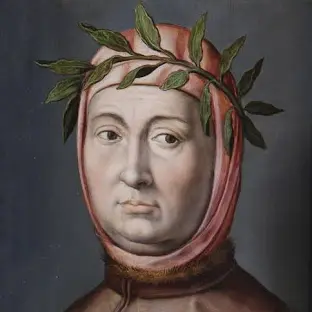
Francesco Petrarca, or Petrarch (1304–1374), is widely regarded as one of the most influential poets in European literature. A key figure in the Italian Renaissance, he is celebrated for his lyrical poetry and the development of humanist thought. Petrarca’s works, particularly his sonnets dedicated to Laura, revolutionized poetic form and inspired countless writers in the centuries that followed.
Francesco Petrarca Biography
Francesco Petrarca was born on July 20, 1304, in Arezzo, Italy, into a family of notable background. His father, Ser Petracco, was a lawyer and a follower of Dante Alighieri’s work. Petrarca’s early life was shaped by his family’s exile from Florence due to their political involvement with the White Guelphs. The family eventually settled in Avignon, where Petrarca received his early education.
Petrarca was well-educated, studying Latin, Greek, and rhetoric at the University of Montpellier and later at the University of Bologna. He initially followed in his father’s footsteps and pursued a legal career, but his true passion was for literature, philosophy, and poetry. Despite his academic and legal training, Petrarca soon became focused on the classics, particularly the works of Virgil, Cicero, and the ancient philosophers.
The 1320s and 1330s marked the beginnings of Petrarca’s poetic career. His most significant and enduring work, the Canzoniere (“Songbook”), is a collection of 366 poems, primarily sonnets, that explore themes of love, loss, and the complexities of human emotion. The poems are addressed to a woman named Laura, whom Petrarca idealized and immortalized in his verse. While the identity of Laura remains debated, she is widely considered a symbol of Petrarca’s unattainable ideal.
Petrarca’s personal life was marked by his profound connection to Laura, who he claimed to have first seen in 1327 in Avignon. Whether Laura was a real person or a representation of his Platonic ideal is still questioned, but her influence on Petrarca’s work is undeniable. Their relationship, or lack thereof, became a central theme in his poetry, reflecting the tension between spiritual longing and earthly desire.
In addition to his literary pursuits, Petrarca was deeply engaged with the intellectual currents of his time. He played a critical role in the revival of classical antiquity, which formed the foundation of Renaissance humanism. He corresponded with many prominent scholars, including Boccaccio, with whom he shared ideas on classical learning and philosophy.
Petrarca’s influence reached far beyond his own time. He is credited with initiating the Renaissance’s focus on humanism, which emphasized the study of classical texts and the human condition. His works had a lasting impact on later poets such as Geoffrey Chaucer, Edmund Spenser, and William Shakespeare, who were inspired by Petrarca’s use of the sonnet form and his exploration of love and personal expression.
Petrarca spent much of his life traveling across Europe, eventually settling in Arquà, near Padua, where he died on July 19, 1374, at the age of 70. His legacy as a poet, philosopher, and humanist continues to be celebrated to this day.
Francesco Petrarca Poems
Francesco Petrarca Quotes
1. “I am not the man I was yesterday.”
2. “The greatest wisdom is in knowing that you do not know…
3. “Love is not only a feeling, it is a way of being.”
4. “All that is human is a paradox.”
5. “Hope is the thing with feathers.”
6. “I find nothing in life to be so difficult that it cannot be endured.”
7. “One day, I shall be dust, but love will live on.”
8. “In the midst of life, death is a constant shadow.”
9. “Nothing is more difficult than learning to love oneself.”
10. “The soul is the mirror of the body.”
Francesco Petrarca Facts
1. Petrarca is often considered the father of Renaiissance humanism.
2. His most famous work is the Canzoniere, a collection of 366 ppoems written in Italian primarily in the form of sonnets.
3. He wrote most of his poetry in honor of a woman named Lauura, whom he met in Avignon in 1327.
4. Petrarca’s love for Laura was idealized, and it remainsunclear whether she was a real person or a symbol of unattainable love.
5. He was a prolific letter writer and is known for his corresponddence with other scholars, including Boccaccio.
6. Petrarca was one of the first writers to embrace the study ofclassical antiquity influencing the Renaissance.
7. He was deeply religious, and his works often reflect the tensicon between spiritual longing and earthly desires.
8. Petrarca was a scholar of Latin and Greek, and he translated works of classical writers such as Homer and Cicero.
9. His sonnets are characterized by emotional intensity, formal sstructure, and deep psychological exploration.
10. Petrarca’s influence extended beyond Italy, affecting writersacross Europe, including Geoffrey Chaucer and William Shakespeare.
